Unit 6 I'm going to study computer science Section A 重要知识考点+练习过关 (含答案)
文档属性
| 名称 | Unit 6 I'm going to study computer science Section A 重要知识考点+练习过关 (含答案) | 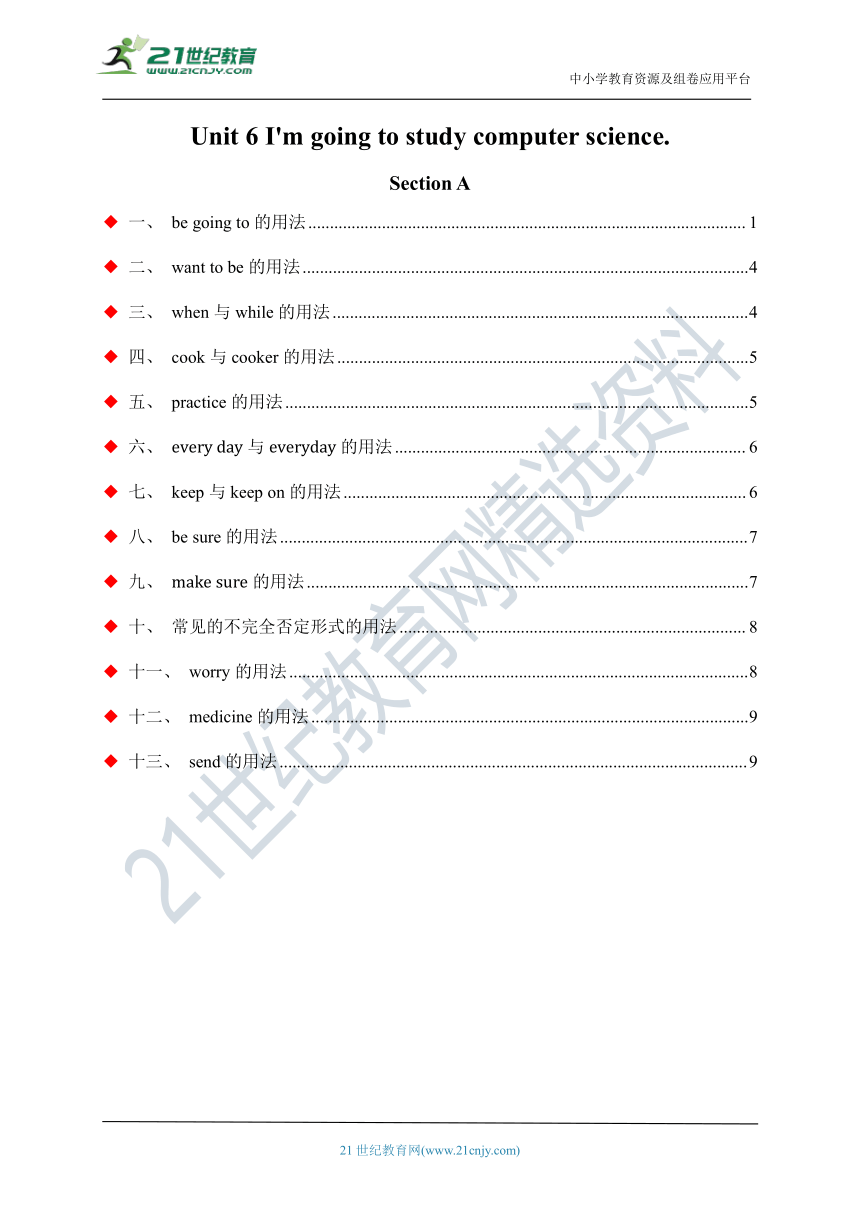 | |
| 格式 | docx | ||
| 文件大小 | 1013.0KB | ||
| 资源类型 | 试卷 | ||
| 版本资源 | 人教新目标(Go for it)版 | ||
| 科目 | 英语 | ||
| 更新时间 | 2021-09-16 08:11:09 | ||
图片预览

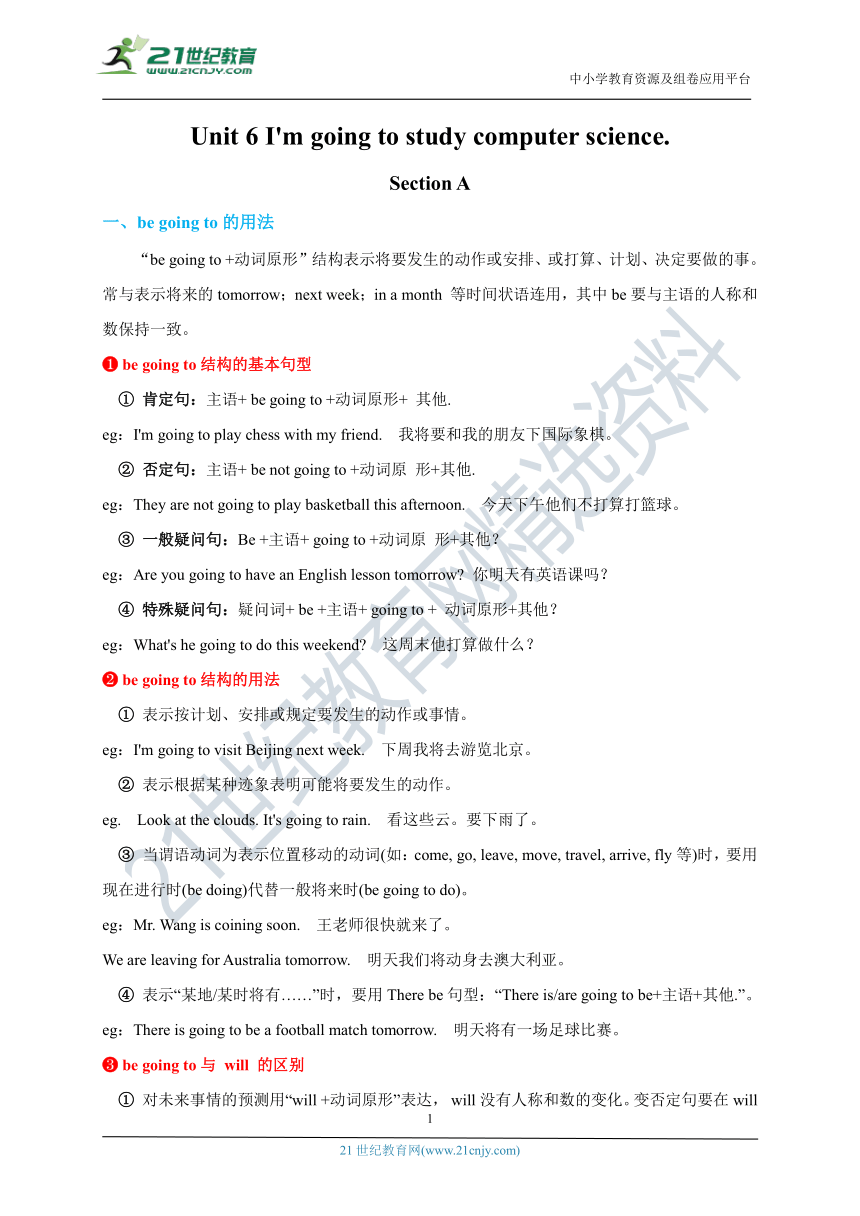
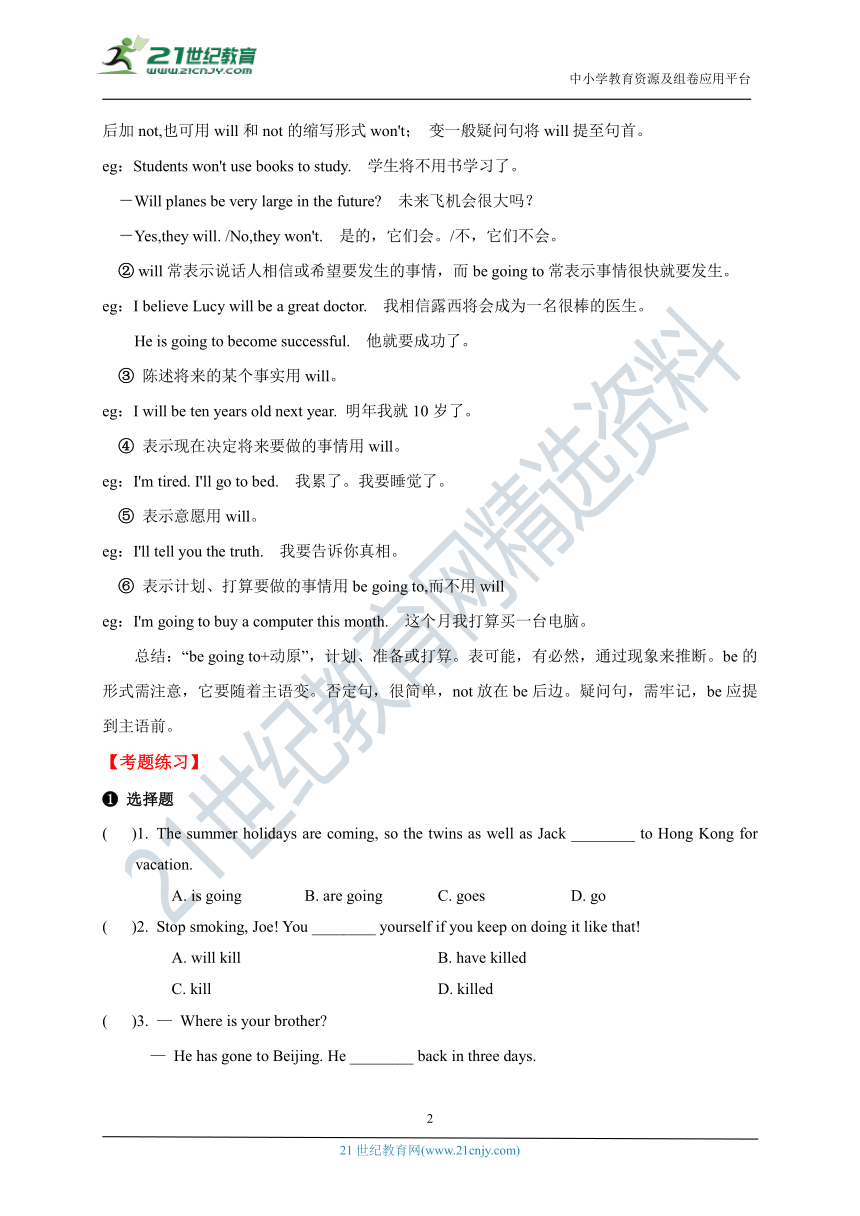
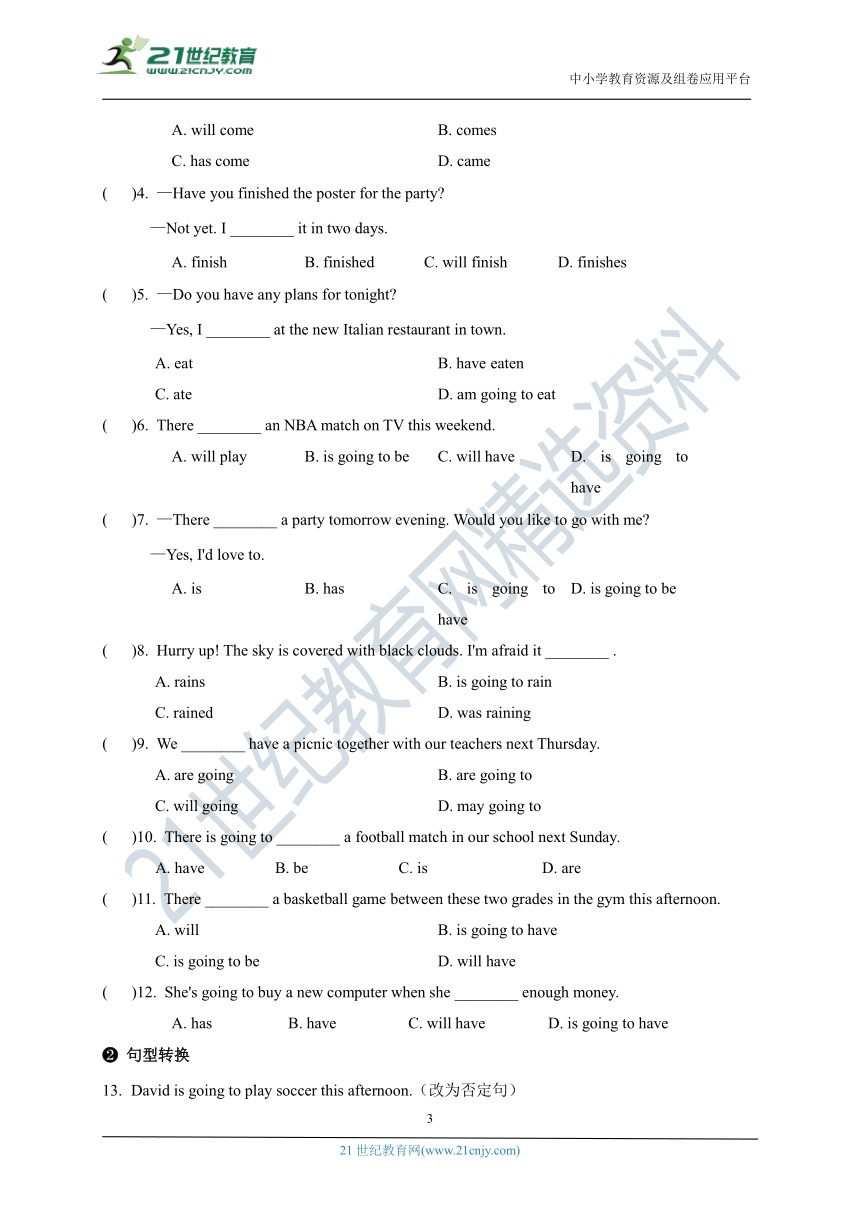
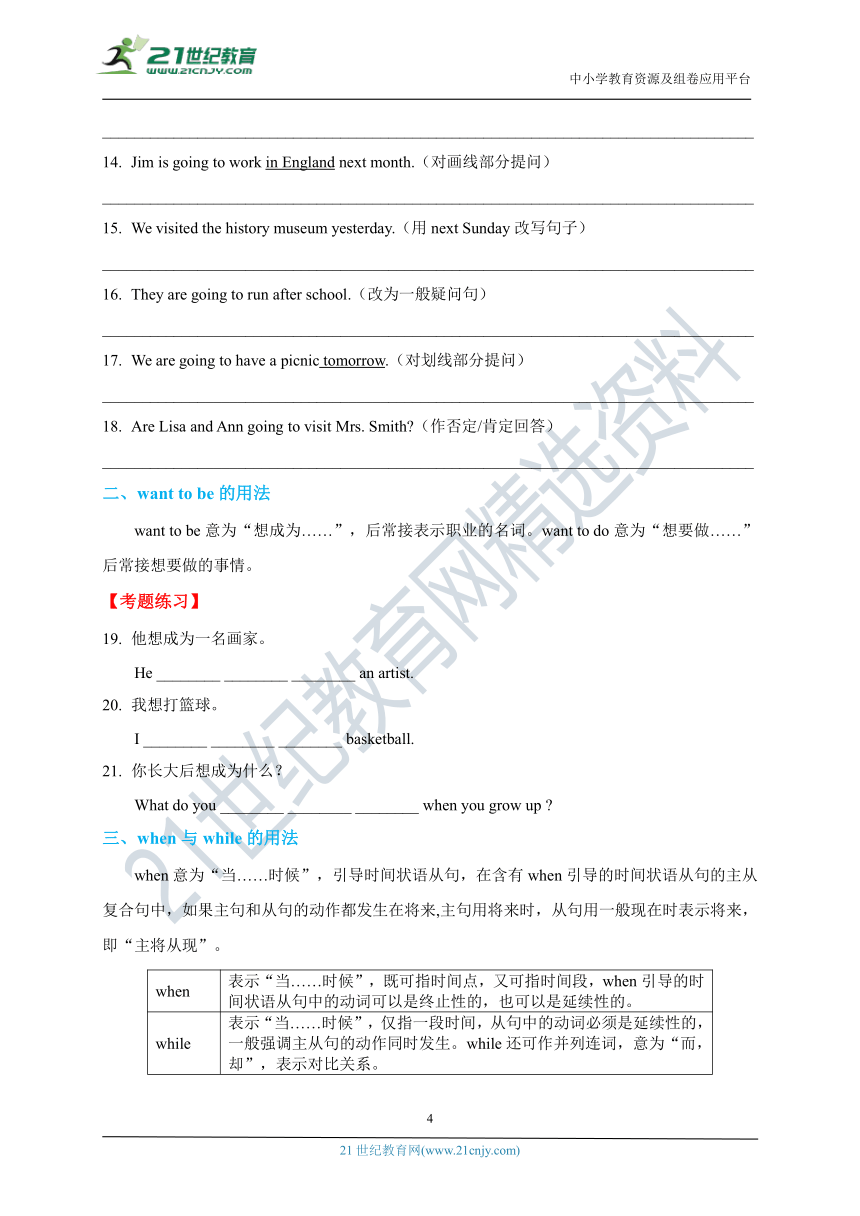
文档简介
Unit
6
I'm
going
to
study
computer
science.
Section
A
一、
be
going
to的用法
1
二、
want
to
be的用法
4
三、
when与while的用法
4
四、
cook与cooker的用法
5
五、
practice的用法
5
六、
every
day与everyday的用法
6
七、
keep与keep
on的用法
6
八、
be
sure的用法
7
九、
make
sure的用法
7
十、
常见的不完全否定形式的用法
8
十一、
worry的用法
8
十二、
medicine的用法
9
十三、
send的用法
9
中小学教育资源及组卷应用平台
21世纪教育网
www.21cnjy.com
精品试卷·第
2
页
(共
2
页)
21世纪教育网(www.21cnjy.com)
Unit
6
I'm
going
to
study
computer
science.
Section
A
be
going
to的用法
“be
going
to
+动词原形”结构表示将要发生的动作或安排、或打算、计划、决定要做的事。常与表示将来的tomorrow;next
week;in
a
month
等时间状语连用,其中be要与主语的人称和数保持一致。
?
be
going
to结构的基本句型
①
肯定句:主语+
be
going
to
+动词原形+
其他.
eg:I'm
going
to
play
chess
with
my
friend.
我将要和我的朋友下国际象棋。
②
否定句:主语+
be
not
going
to
+动词原
形+其他.
eg:They
are
not
going
to
play
basketball
this
afternoon.
今天下午他们不打算打篮球。
③
一般疑问句:Be
+主语+
going
to
+动词原
形+其他?
eg:Are
you
going
to
have
an
English
lesson
tomorrow?
你明天有英语课吗?
④
特殊疑问句:疑问词+
be
+主语+
going
to
+
动词原形+其他?
eg:What's
he
going
to
do
this
weekend?
这周末他打算做什么?
?
be
going
to结构的用法
①
表示按计划、安排或规定要发生的动作或事情。
eg:I'm
going
to
visit
Beijing
next
week.
下周我将去游览北京。
②
表示根据某种迹象表明可能将要发生的动作。
eg.
Look
at
the
clouds.
It's
going
to
rain.
看这些云。要下雨了。
③
当谓语动词为表示位置移动的动词(如:come,
go,
leave,
move,
travel,
arrive,
fly等)时,要用现在进行时(be
doing)代替一般将来时(be
going
to
do)。
eg:Mr.
Wang
is
coining
soon.
王老师很快就来了。
We
are
leaving
for
Australia
tomorrow.
明天我们将动身去澳大利亚。
④
表示“某地/某时将有……”时,要用There
be句型:“There
is/are
going
to
be+主语+其他.”。
eg:There
is
going
to
be
a
football
match
tomorrow.
明天将有一场足球比赛。
?
be
going
to与
will
的区别
①
对未来事情的预测用“will
+动词原形”表达,
will没有人称和数的变化。变否定句要在will后加not,也可用will和not的缩写形式won't;
变一般疑问句将will提至句首。
eg:Students
won't
use
books
to
study.
学生将不用书学习了。
-Will
planes
be
very
large
in
the
future?
未来飞机会很大吗?
-Yes,they
will.
/No,they
won't.
是的,它们会。/不,它们不会。
②
will常表示说话人相信或希望要发生的事情,而be
going
to常表示事情很快就要发生。
eg:I
believe
Lucy
will
be
a
great
doctor.
我相信露西将会成为一名很棒的医生。
He
is
going
to
become
successful.
他就要成功了。
③
陈述将来的某个事实用will。
eg:I
will
be
ten
years
old
next
year.
明年我就10岁了。
④
表示现在决定将来要做的事情用will。
eg:I'm
tired.
I'll
go
to
bed.
我累了。我要睡觉了。
⑤
表示意愿用will。
eg:I'll
tell
you
the
truth.
我要告诉你真相。
⑥
表示计划、打算要做的事情用be
going
to,而不用will
eg:I'm
going
to
buy
a
computer
this
month.
这个月我打算买一台电脑。
总结:“be
going
to+动原”,计划、准备或打算。表可能,有必然,通过现象来推断。be的形式需注意,它要随着主语变。否定句,很简单,not放在be后边。疑问句,需牢记,be应提到主语前。
【考题练习】
?
选择题
The
summer
holidays
are
coming,
so
the
twins
as
well
as
Jack
________
to
Hong
Kong
for
vacation.
A.
is
going
B.
are
going
C.
goes
D.
go
Stop
smoking,
Joe!
You
________
yourself
if
you
keep
on
doing
it
like
that!
A.
will
kill
B.
have
killed
C.
kill
D.
killed
—
Where
is
your
brother?
—
He
has
gone
to
Beijing.
He
________
back
in
three
days.
A.
will
come
B.
comes
C.
has
come
D.
came
—Have
you
finished
the
poster
for
the
party?
—Not
yet.
I
________
it
in
two
days.
A.
finish
B.
finished
C.
will
finish
D.
finishes
—Do
you
have
any
plans
for
tonight?
—Yes,
I
________
at
the
new
Italian
restaurant
in
town.
A.
eat
B.
have
eaten
C.
ate
D.
am
going
to
eat
There
________
an
NBA
match
on
TV
this
weekend.
A.
will
play
B.
is
going
to
be
C.
will
have
D.
is
going
to
have
—There
________
a
party
tomorrow
evening.
Would
you
like
to
go
with
me?
—Yes,
I'd
love
to.
A.
is
B.
has
C.
is
going
to
have
D.
is
going
to
be
Hurry
up!
The
sky
is
covered
with
black
clouds.
I'm
afraid
it
________
.
A.
rains
B.
is
going
to
rain
C.
rained
D.
was
raining
We
________
have
a
picnic
together
with
our
teachers
next
Thursday.
A.
are
going
B.
are
going
to
C.
will
going
D.
may
going
to
There
is
going
to
________
a
football
match
in
our
school
next
Sunday.
A.
have
B.
be
C.
is
D.
are
There
________
a
basketball
game
between
these
two
grades
in
the
gym
this
afternoon.
A.
will
B.
is
going
to
have
C.
is
going
to
be
D.
will
have
She's
going
to
buy
a
new
computer
when
she
________
enough
money.
A.
has
B.
have
C.
will
have
D.
is
going
to
have
?
句型转换
David
is
going
to
play
soccer
this
afternoon.(改为否定句)
__________________________________________________________________________________
Jim
is
going
to
work
in
England
next
month.(对画线部分提问)
__________________________________________________________________________________
We
visited
the
history
museum
yesterday.(用next
Sunday改写句子)
__________________________________________________________________________________
They
are
going
to
run
after
school.(改为一般疑问句)
__________________________________________________________________________________
We
are
going
to
have
a
picnic
tomorrow.(对划线部分提问)
__________________________________________________________________________________
Are
Lisa
and
Ann
going
to
visit
Mrs.
Smith?(作否定/肯定回答)
__________________________________________________________________________________
want
to
be的用法
want
to
be意为“想成为……”,后常接表示职业的名词。want
to
do意为“想要做……”后常接想要做的事情。
【考题练习】
他想成为一名画家。
He
________
________
________
an
artist.
我想打篮球。
I
________
________
________
basketball.
你长大后想成为什么?
What
do
you
________
________
________
when
you
grow
up
?
when与while的用法
when意为“当……时候”,引导时间状语从句,在含有when引导的时间状语从句的主从复合句中,如果主句和从句的动作都发生在将来,主句用将来时,从句用一般现在时表示将来,即“主将从现”。
when
表示“当……时候”,既可指时间点,又可指时间段,when引导的时间状语从句中的动词可以是终止性的,也可以是延续性的。
while
表示“当……时候”,仅指一段时间,从句中的动词必须是延续性的,一般强调主从句的动作同时发生。while还可作并列连词,意为“而,却”,表示对比关系。
【考题练习】
I
was
listening
to
the
radio________he
came
in.
(when/while)
________he
came
back.
I
was
doing
some
washing.
(when/while)
________the
teacher
came
in.
we
were
talking.
(when/while)
I
was
cooking
dinner________they
came
home.
(when/while)
He
fell
asleep________he
was
reading.
(when/while)
He
asked
me
a
question________I
was
speaking.
(when/while)
Jim
hurt
his
arm________he
was
playing
tennis.
(when/while)
________she
was
waiting
for
the
train,
she
became
very
impatient.
(when/while)
He
was
watching
TV________she
was
cooking.
(when/while)
Tom
is
strong________his
younger
brother
is
weak.
(when/while)
cook与cooker的用法
cook
cook作可数名词,意为“厨师”。
cook还可作动词,意为“烹调,煮,烧”。
cooker
cooker可数名词,意为“厨具,炊具”。
【考题练习】
他的父亲是一位优秀的厨师。
His
father
is
a
great________.
她应该学习做饭。
She
should________
________
________.
我妈妈正在做鱼。
My
mother________
________the
fish.
他买了一个新煤气灶。
He
bought
a
new
gas(煤气)
________.
practice的用法
practice及物动词,意为“练习”,后接名词、代词或动词-ing形式作宾语。
常跟动词-ing形式作宾语的动词(短语)有:顺口溜来帮你
考虑建议盼原谅
consider;suggest/
advise;
look
forward
to;excuse/pardon
承认推迟没得想
admit;delay/put
off;fancy(想要;想做)
避免错过继续练
avoid;miss;keep/keep
on;practice
否认完成能欣赏
deny(否认);finish;enjoy/
appreciate(欣赏)
不禁介意与逃走
can't
help;mind;escape(逃跑)
不准冒险凭想象
Forbid(禁止);risk;imagine
也不用死记硬背,一般跟-ing所做的事情,一般是同时,正在做或做过的事情。跟to
do所做的事是还没做,将要做的事情。
【考题练习】
我打算每天练习(打)篮球。
I'm
going
to
________
________every
day.
你姐姐正在房间里练习(弹)吉他。
Your
elder
sister
________
________
the
guitar
in
the
room.
你需要每天练习说英语。
You
need
to
________
________
________
every
day.
every
day与everyday的用法
every
day
“每天”,为副词短语,在句中作状语,一般位于句首或句末。
everyday
“每天的”,为形容词,在句中作定语,一般位于名词前面。
【考题练习】
我每天步行去上学。
I
go
to
school
on
foot
________________.
这是我们每天的家庭作业。
This
is
our
________________
homework.
keep与keep
on的用法
keep
on
doing
sth.
“继续做某事”,指中间有休息或停顿,强调时间的间隔性和动作的反复性,或某人做某事的决心。
keep
doing
sth.
“一直做某事”,表示动作或状态的持续,没有间隔。
【考题练习】
尽管我们建议他戒烟,但是他还是继续吸烟。
He
________
________
smoking
though
we
advised
him
to
stop
smoking.
这位老人不断地来给我们送热水。
This
old
man
________
________
coming
to
offer
us
hot
water.
他在那儿一动不动地站了一个小时。
He
________
________
there
for
an
hour
without
moving.
be
sure的用法
be
sure
about意为“确信;对……有把握”,与be
sure
of同义,后接名词、代词或动词-ing形式,句子主语是人,不能是物。
eg:He
is
sure
about/of
success.
他相信会成功。
?
be
sure意为“务必;切记”,用于祈使句,后接动词不定式,表示说话人向对方提出要求。
eg:Be
sure
to
give
it
back
to
me
on
time.
务必按时将它还给我。
?
be
sure意为“一定;肯定”,用于肯定句,后接动词不定式,表示说话人的推测或判断,主语可以是人也可以是物。
eg:My
father
is
sure
to
live
to
be
ninety.
我父亲一定会活到90岁。
?
be
sure
+
that从句,意为“肯定……;有把握……”,主句的主语是人。
eg:I'm
sure
that
the
books
are
of
great
use
to
you.
这些书肯定对你有用。
【考题练习】
这个人确信会活到90岁。
This
man
________
________
________
living
to
be
ninety.
明天务必来。
________
________
________
come
tomorrow.
明天一定会下雨。
It
________
________
________
rain
tomorrow.
我确信吸烟对健康不益。
I________
________
________
smoking
is
not
good
for
health.
make
sure的用法
make
sure意为“确保;查明”,常用于祈使句中,表示请求或要求对方按照要求做某事,其后可接that引导的宾语从句或of短语。
【考题练习】
你要确保在5点钟来接我们。
________
________
________
you
pick
us
up
at
five
o'clock.
我们订好电影院的座位了。
We________
________
________
our
seats
for
the
movie.
只要确保你尽力了就行。
Just
________
________
you
try
your
best.
常见的不完全否定形式的用法
?
no
everyone
意为“不是每个人”,是不完全否定形式。
eg:Not
everyone
likes
hamburgers.
不是每个人都喜欢汉堡包。
?
all的否定式:not
all……(或all……not),意为“并非都……,不是所有的都……”。
eg.
Not
all
men
can
be
masters.
=
All
men
can
not
be
masters.
并非人人都能当领导。
?
both的否定式:not
both……(或both……not),意为“并非两者……都……”。
eg.
I
don't
want
both
the
books.
我不是两本书都想要。
?
every的否定式:not
every……(或
every……not);意为“不是每个……都……”
eg.
Not
every
book
is
educational.=Every
book
is
not
educational.不是每本书都有教育意义。
【考题练习】
不是每个人都知道他们想成为什么。
________
________
knows
what
they
want
to
be.
并非所有的动物都是马。
________
________
animals
are
horses.
两扇窗子并不是都开着。
________
(the)
windows
are
________
open.
并非每件事都是困难的。
________
________
thing
is
difficult.
worry的用法
worry作不及物动词,意为“担心;担忧”。worry
about为固定短语,意为“担心”,与
be
worried
about
同义。
【考题练习】
不要担心。一切都会好起来的。
________
________.
Everything
will
be
all
right.
不要担心我,照顾好你自己。
Don't
________
________
me
and
look
after
yourself.
medicine的用法
medicine作不可数名词,意为“医学;药”,其形容词为medical“医疗的;内科的”;“吃药”意为“take
the
medicine”而不是“have/eat
medicine”。
【考题练习】
我长大后想学习医学。
I
want
to
________
________
when
I
grow
up.
一天吃两次药。
________
________
________
twice
a
day.
send的用法
send及物动词,意为“邮寄;发送”,其过去式为sent,常用于send
sb.
sth.
=
send
sth.
to
sb.结构,意为“给某人寄/发送某物”。
【考题练习】
I'll
send
you
a
text
message.(改为同义句)
I'll
________
a
text
message
________
you
.
我打算将此信息发给广播电台。
I'm
going
to
________
the
information
________
the
radio
station.
参
考
答
案
B
A
A
C
D
B
D
B
B
B
C
A
David
isn't
going
to
play
soccer
this
afternoon.
Where
is
Jim
going
to
work
next
month?
We
are
going
to/will
visit
the
history
museum
next
Sunday.
Are
they
going
to
run
after
school?
When
are
you
going
to
have
a
picnic?
Yes,
they
are
/
No,
they
aren't
wants
to
be
want
to
play
want
to
be
when
when
when
when
when/while
when
when/while
while
while
while
cook
learn
to
cook
is
cooking
cooker
practice
basketball
is
practicing
practice
speaking
English
every
day
everyday
kept
on
kept
on
kept
standing
is
sure
about/of
Be
sure
to
is
sure
to
am
sure
that
Make
sure
that
made
sure
of
make
sure
Not
everyone
Not
all
Both;not
Not
every
Don't
worry
worry
about
study
medicine
Take
the
medicine
send;to
send;to
21世纪教育网(www.21cnjy.com)
6
I'm
going
to
study
computer
science.
Section
A
一、
be
going
to的用法
1
二、
want
to
be的用法
4
三、
when与while的用法
4
四、
cook与cooker的用法
5
五、
practice的用法
5
六、
every
day与everyday的用法
6
七、
keep与keep
on的用法
6
八、
be
sure的用法
7
九、
make
sure的用法
7
十、
常见的不完全否定形式的用法
8
十一、
worry的用法
8
十二、
medicine的用法
9
十三、
send的用法
9
中小学教育资源及组卷应用平台
21世纪教育网
www.21cnjy.com
精品试卷·第
2
页
(共
2
页)
21世纪教育网(www.21cnjy.com)
Unit
6
I'm
going
to
study
computer
science.
Section
A
be
going
to的用法
“be
going
to
+动词原形”结构表示将要发生的动作或安排、或打算、计划、决定要做的事。常与表示将来的tomorrow;next
week;in
a
month
等时间状语连用,其中be要与主语的人称和数保持一致。
?
be
going
to结构的基本句型
①
肯定句:主语+
be
going
to
+动词原形+
其他.
eg:I'm
going
to
play
chess
with
my
friend.
我将要和我的朋友下国际象棋。
②
否定句:主语+
be
not
going
to
+动词原
形+其他.
eg:They
are
not
going
to
play
basketball
this
afternoon.
今天下午他们不打算打篮球。
③
一般疑问句:Be
+主语+
going
to
+动词原
形+其他?
eg:Are
you
going
to
have
an
English
lesson
tomorrow?
你明天有英语课吗?
④
特殊疑问句:疑问词+
be
+主语+
going
to
+
动词原形+其他?
eg:What's
he
going
to
do
this
weekend?
这周末他打算做什么?
?
be
going
to结构的用法
①
表示按计划、安排或规定要发生的动作或事情。
eg:I'm
going
to
visit
Beijing
next
week.
下周我将去游览北京。
②
表示根据某种迹象表明可能将要发生的动作。
eg.
Look
at
the
clouds.
It's
going
to
rain.
看这些云。要下雨了。
③
当谓语动词为表示位置移动的动词(如:come,
go,
leave,
move,
travel,
arrive,
fly等)时,要用现在进行时(be
doing)代替一般将来时(be
going
to
do)。
eg:Mr.
Wang
is
coining
soon.
王老师很快就来了。
We
are
leaving
for
Australia
tomorrow.
明天我们将动身去澳大利亚。
④
表示“某地/某时将有……”时,要用There
be句型:“There
is/are
going
to
be+主语+其他.”。
eg:There
is
going
to
be
a
football
match
tomorrow.
明天将有一场足球比赛。
?
be
going
to与
will
的区别
①
对未来事情的预测用“will
+动词原形”表达,
will没有人称和数的变化。变否定句要在will后加not,也可用will和not的缩写形式won't;
变一般疑问句将will提至句首。
eg:Students
won't
use
books
to
study.
学生将不用书学习了。
-Will
planes
be
very
large
in
the
future?
未来飞机会很大吗?
-Yes,they
will.
/No,they
won't.
是的,它们会。/不,它们不会。
②
will常表示说话人相信或希望要发生的事情,而be
going
to常表示事情很快就要发生。
eg:I
believe
Lucy
will
be
a
great
doctor.
我相信露西将会成为一名很棒的医生。
He
is
going
to
become
successful.
他就要成功了。
③
陈述将来的某个事实用will。
eg:I
will
be
ten
years
old
next
year.
明年我就10岁了。
④
表示现在决定将来要做的事情用will。
eg:I'm
tired.
I'll
go
to
bed.
我累了。我要睡觉了。
⑤
表示意愿用will。
eg:I'll
tell
you
the
truth.
我要告诉你真相。
⑥
表示计划、打算要做的事情用be
going
to,而不用will
eg:I'm
going
to
buy
a
computer
this
month.
这个月我打算买一台电脑。
总结:“be
going
to+动原”,计划、准备或打算。表可能,有必然,通过现象来推断。be的形式需注意,它要随着主语变。否定句,很简单,not放在be后边。疑问句,需牢记,be应提到主语前。
【考题练习】
?
选择题
The
summer
holidays
are
coming,
so
the
twins
as
well
as
Jack
________
to
Hong
Kong
for
vacation.
A.
is
going
B.
are
going
C.
goes
D.
go
Stop
smoking,
Joe!
You
________
yourself
if
you
keep
on
doing
it
like
that!
A.
will
kill
B.
have
killed
C.
kill
D.
killed
—
Where
is
your
brother?
—
He
has
gone
to
Beijing.
He
________
back
in
three
days.
A.
will
come
B.
comes
C.
has
come
D.
came
—Have
you
finished
the
poster
for
the
party?
—Not
yet.
I
________
it
in
two
days.
A.
finish
B.
finished
C.
will
finish
D.
finishes
—Do
you
have
any
plans
for
tonight?
—Yes,
I
________
at
the
new
Italian
restaurant
in
town.
A.
eat
B.
have
eaten
C.
ate
D.
am
going
to
eat
There
________
an
NBA
match
on
TV
this
weekend.
A.
will
play
B.
is
going
to
be
C.
will
have
D.
is
going
to
have
—There
________
a
party
tomorrow
evening.
Would
you
like
to
go
with
me?
—Yes,
I'd
love
to.
A.
is
B.
has
C.
is
going
to
have
D.
is
going
to
be
Hurry
up!
The
sky
is
covered
with
black
clouds.
I'm
afraid
it
________
.
A.
rains
B.
is
going
to
rain
C.
rained
D.
was
raining
We
________
have
a
picnic
together
with
our
teachers
next
Thursday.
A.
are
going
B.
are
going
to
C.
will
going
D.
may
going
to
There
is
going
to
________
a
football
match
in
our
school
next
Sunday.
A.
have
B.
be
C.
is
D.
are
There
________
a
basketball
game
between
these
two
grades
in
the
gym
this
afternoon.
A.
will
B.
is
going
to
have
C.
is
going
to
be
D.
will
have
She's
going
to
buy
a
new
computer
when
she
________
enough
money.
A.
has
B.
have
C.
will
have
D.
is
going
to
have
?
句型转换
David
is
going
to
play
soccer
this
afternoon.(改为否定句)
__________________________________________________________________________________
Jim
is
going
to
work
in
England
next
month.(对画线部分提问)
__________________________________________________________________________________
We
visited
the
history
museum
yesterday.(用next
Sunday改写句子)
__________________________________________________________________________________
They
are
going
to
run
after
school.(改为一般疑问句)
__________________________________________________________________________________
We
are
going
to
have
a
picnic
tomorrow.(对划线部分提问)
__________________________________________________________________________________
Are
Lisa
and
Ann
going
to
visit
Mrs.
Smith?(作否定/肯定回答)
__________________________________________________________________________________
want
to
be的用法
want
to
be意为“想成为……”,后常接表示职业的名词。want
to
do意为“想要做……”后常接想要做的事情。
【考题练习】
他想成为一名画家。
He
________
________
________
an
artist.
我想打篮球。
I
________
________
________
basketball.
你长大后想成为什么?
What
do
you
________
________
________
when
you
grow
up
?
when与while的用法
when意为“当……时候”,引导时间状语从句,在含有when引导的时间状语从句的主从复合句中,如果主句和从句的动作都发生在将来,主句用将来时,从句用一般现在时表示将来,即“主将从现”。
when
表示“当……时候”,既可指时间点,又可指时间段,when引导的时间状语从句中的动词可以是终止性的,也可以是延续性的。
while
表示“当……时候”,仅指一段时间,从句中的动词必须是延续性的,一般强调主从句的动作同时发生。while还可作并列连词,意为“而,却”,表示对比关系。
【考题练习】
I
was
listening
to
the
radio________he
came
in.
(when/while)
________he
came
back.
I
was
doing
some
washing.
(when/while)
________the
teacher
came
in.
we
were
talking.
(when/while)
I
was
cooking
dinner________they
came
home.
(when/while)
He
fell
asleep________he
was
reading.
(when/while)
He
asked
me
a
question________I
was
speaking.
(when/while)
Jim
hurt
his
arm________he
was
playing
tennis.
(when/while)
________she
was
waiting
for
the
train,
she
became
very
impatient.
(when/while)
He
was
watching
TV________she
was
cooking.
(when/while)
Tom
is
strong________his
younger
brother
is
weak.
(when/while)
cook与cooker的用法
cook
cook作可数名词,意为“厨师”。
cook还可作动词,意为“烹调,煮,烧”。
cooker
cooker可数名词,意为“厨具,炊具”。
【考题练习】
他的父亲是一位优秀的厨师。
His
father
is
a
great________.
她应该学习做饭。
She
should________
________
________.
我妈妈正在做鱼。
My
mother________
________the
fish.
他买了一个新煤气灶。
He
bought
a
new
gas(煤气)
________.
practice的用法
practice及物动词,意为“练习”,后接名词、代词或动词-ing形式作宾语。
常跟动词-ing形式作宾语的动词(短语)有:顺口溜来帮你
考虑建议盼原谅
consider;suggest/
advise;
look
forward
to;excuse/pardon
承认推迟没得想
admit;delay/put
off;fancy(想要;想做)
避免错过继续练
avoid;miss;keep/keep
on;practice
否认完成能欣赏
deny(否认);finish;enjoy/
appreciate(欣赏)
不禁介意与逃走
can't
help;mind;escape(逃跑)
不准冒险凭想象
Forbid(禁止);risk;imagine
也不用死记硬背,一般跟-ing所做的事情,一般是同时,正在做或做过的事情。跟to
do所做的事是还没做,将要做的事情。
【考题练习】
我打算每天练习(打)篮球。
I'm
going
to
________
________every
day.
你姐姐正在房间里练习(弹)吉他。
Your
elder
sister
________
________
the
guitar
in
the
room.
你需要每天练习说英语。
You
need
to
________
________
________
every
day.
every
day与everyday的用法
every
day
“每天”,为副词短语,在句中作状语,一般位于句首或句末。
everyday
“每天的”,为形容词,在句中作定语,一般位于名词前面。
【考题练习】
我每天步行去上学。
I
go
to
school
on
foot
________________.
这是我们每天的家庭作业。
This
is
our
________________
homework.
keep与keep
on的用法
keep
on
doing
sth.
“继续做某事”,指中间有休息或停顿,强调时间的间隔性和动作的反复性,或某人做某事的决心。
keep
doing
sth.
“一直做某事”,表示动作或状态的持续,没有间隔。
【考题练习】
尽管我们建议他戒烟,但是他还是继续吸烟。
He
________
________
smoking
though
we
advised
him
to
stop
smoking.
这位老人不断地来给我们送热水。
This
old
man
________
________
coming
to
offer
us
hot
water.
他在那儿一动不动地站了一个小时。
He
________
________
there
for
an
hour
without
moving.
be
sure的用法
be
sure
about意为“确信;对……有把握”,与be
sure
of同义,后接名词、代词或动词-ing形式,句子主语是人,不能是物。
eg:He
is
sure
about/of
success.
他相信会成功。
?
be
sure意为“务必;切记”,用于祈使句,后接动词不定式,表示说话人向对方提出要求。
eg:Be
sure
to
give
it
back
to
me
on
time.
务必按时将它还给我。
?
be
sure意为“一定;肯定”,用于肯定句,后接动词不定式,表示说话人的推测或判断,主语可以是人也可以是物。
eg:My
father
is
sure
to
live
to
be
ninety.
我父亲一定会活到90岁。
?
be
sure
+
that从句,意为“肯定……;有把握……”,主句的主语是人。
eg:I'm
sure
that
the
books
are
of
great
use
to
you.
这些书肯定对你有用。
【考题练习】
这个人确信会活到90岁。
This
man
________
________
________
living
to
be
ninety.
明天务必来。
________
________
________
come
tomorrow.
明天一定会下雨。
It
________
________
________
rain
tomorrow.
我确信吸烟对健康不益。
I________
________
________
smoking
is
not
good
for
health.
make
sure的用法
make
sure意为“确保;查明”,常用于祈使句中,表示请求或要求对方按照要求做某事,其后可接that引导的宾语从句或of短语。
【考题练习】
你要确保在5点钟来接我们。
________
________
________
you
pick
us
up
at
five
o'clock.
我们订好电影院的座位了。
We________
________
________
our
seats
for
the
movie.
只要确保你尽力了就行。
Just
________
________
you
try
your
best.
常见的不完全否定形式的用法
?
no
everyone
意为“不是每个人”,是不完全否定形式。
eg:Not
everyone
likes
hamburgers.
不是每个人都喜欢汉堡包。
?
all的否定式:not
all……(或all……not),意为“并非都……,不是所有的都……”。
eg.
Not
all
men
can
be
masters.
=
All
men
can
not
be
masters.
并非人人都能当领导。
?
both的否定式:not
both……(或both……not),意为“并非两者……都……”。
eg.
I
don't
want
both
the
books.
我不是两本书都想要。
?
every的否定式:not
every……(或
every……not);意为“不是每个……都……”
eg.
Not
every
book
is
educational.=Every
book
is
not
educational.不是每本书都有教育意义。
【考题练习】
不是每个人都知道他们想成为什么。
________
________
knows
what
they
want
to
be.
并非所有的动物都是马。
________
________
animals
are
horses.
两扇窗子并不是都开着。
________
(the)
windows
are
________
open.
并非每件事都是困难的。
________
________
thing
is
difficult.
worry的用法
worry作不及物动词,意为“担心;担忧”。worry
about为固定短语,意为“担心”,与
be
worried
about
同义。
【考题练习】
不要担心。一切都会好起来的。
________
________.
Everything
will
be
all
right.
不要担心我,照顾好你自己。
Don't
________
________
me
and
look
after
yourself.
medicine的用法
medicine作不可数名词,意为“医学;药”,其形容词为medical“医疗的;内科的”;“吃药”意为“take
the
medicine”而不是“have/eat
medicine”。
【考题练习】
我长大后想学习医学。
I
want
to
________
________
when
I
grow
up.
一天吃两次药。
________
________
________
twice
a
day.
send的用法
send及物动词,意为“邮寄;发送”,其过去式为sent,常用于send
sb.
sth.
=
send
sth.
to
sb.结构,意为“给某人寄/发送某物”。
【考题练习】
I'll
send
you
a
text
message.(改为同义句)
I'll
________
a
text
message
________
you
.
我打算将此信息发给广播电台。
I'm
going
to
________
the
information
________
the
radio
station.
参
考
答
案
B
A
A
C
D
B
D
B
B
B
C
A
David
isn't
going
to
play
soccer
this
afternoon.
Where
is
Jim
going
to
work
next
month?
We
are
going
to/will
visit
the
history
museum
next
Sunday.
Are
they
going
to
run
after
school?
When
are
you
going
to
have
a
picnic?
Yes,
they
are
/
No,
they
aren't
wants
to
be
want
to
play
want
to
be
when
when
when
when
when/while
when
when/while
while
while
while
cook
learn
to
cook
is
cooking
cooker
practice
basketball
is
practicing
practice
speaking
English
every
day
everyday
kept
on
kept
on
kept
standing
is
sure
about/of
Be
sure
to
is
sure
to
am
sure
that
Make
sure
that
made
sure
of
make
sure
Not
everyone
Not
all
Both;not
Not
every
Don't
worry
worry
about
study
medicine
Take
the
medicine
send;to
send;to
21世纪教育网(www.21cnjy.com)
同课章节目录
- Unit 1 Where did you go on vacation?
- Section A
- Section B
- Unit 2 How often do you exercise?
- Section A
- Section B
- Unit 3 I'm more outgoing than my sister.
- Section A
- Section B
- Unit 4 What's the best movie theater?
- Section A
- Section B
- Unit 5 Do you want to watch a game show?
- Section A
- Section B
- Unit 6 I'm going to study computer science.
- Section A
- Section B
- Unit 7 Will people have robots?
- Section A
- Section B
- Unit 8 How do you make a banana milk shake?
- Section A
- Section B
- Unit 9 Can you come to my party?
- Section A
- Section B
- Unit 10 If you go to the party, you'll have a grea
- Section A
- Section B
